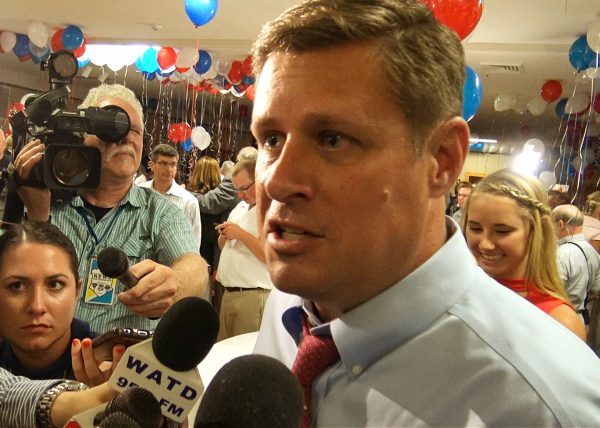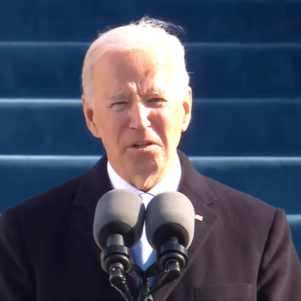How Geoff Diehl’s Conservative Crusade Will Lead to the U.S. Senate
By James P. Freeman | August 21, 2017, 20:02 EDT
 Whitman GOP state Representative Geff Diehl fields questions from the media following his official 2018 U.S. Senate campaign announcement. (Evan Lips — New Boston Post)
Whitman GOP state Representative Geff Diehl fields questions from the media following his official 2018 U.S. Senate campaign announcement. (Evan Lips — New Boston Post)
He seems nearly uninterested, certainly unmoved, by the potential link to a lineage of rich Massachusetts political history. He would be the first sitting state representative to win election to the U.S. Senate since Republican Henry Cabot Lodge Jr. upset popular Democrat governor James M. Curley in 1936. He would also be the first Republican to beat an incumbent Democrat senator in a general election since Lodge defeated David I. Walsh (after Lodge returned from serving in WWII) in 1946. And he would be the first Republican to claim victory in a general election for the Senate since Edward W. Brooke III (the first African-American elected by popular vote to the chamber, in 1966) was reelected in 1972. Geoff Diehl, however improbably, would simply be content to “represent all the people” of Massachusetts after the 2018 senate race. He is undaunted being underestimated.
Dressed in summer khakis with blue Oxford shirt, and seated in a booth at the Fireside Grille in Middleborough, Diehl appeared disarmingly comfortable during the interview for this column. Relaxed, in fact.
There were no aides hovering about. There was no iPhone recording the conversation. There were no prepared answers-in-advance to questions. Instead, for nearly two hours, Diehl spoke in thoughtful and measured tones about his bid to unseat Massachusetts’s senior senator, Elizabeth Warren. The Elizabeth Warren. A populist machine politician. And progressivism’s marquee player.
Diehl envisions his own grass-roots, populist conservative crusade.
Now in his fourth term as state representative from Whitman (7th Plymouth House District), part of the increasingly conservative enclave of southeastern Massachusetts, Diehl’s strategy is simple: He will position himself as the genuine conservative response to Warren, as only a conservative, not a moderate, can present clearly the stark differences and choices between conservatism and progressivism. That means running now as if this is the general election — not a primary — and as if he is the Republican nominee. It’s a bold, if not risky, calculation.
Diehl’s political instincts may prove correct, as the 2018 race will be manifestly partisan. (It may be seen as a referendum on President Donald Trump, for instance.) At least two likely Republican challengers are definitively moderate. Beth Lindstrom (a former Mitt Romney aide and former Scott Brown campaign manager) and John Kingston (an unenrolled wealthy businessman and outspoken Trump critic) are well connected to the insular Massachusetts Republican apparatus and are probably favored by Republican Governor Charlie Baker’s operatives. (As Baker, a moderate himself, seeks reelection and harmony next year.) But Baker is an anomaly; moderate Republicans have been routinely slaughtered in the Bay State over the last decade. Something Diehl clearly understands too.
Sensibly, as wickedlocal.com wrote earlier this month (and the candidate confirmed in person), “Diehl is focusing his campaign on economic issues rather than social ones.” He looks at the immigration debate, for instance, in terms of labor relations and education costs. He sees foreign policy as matters of trade and competitiveness, not just alliances combatting global bad guys. He also believes educational curricula need to be better aligned with emerging technologies.
He calls today’s tax policy “erratic” and “problematic.” Along with regulatory compliance, an incoherent and inconsistent tax policy (millionaire’s tax here, graduated income tax there, property tax everywhere) hurts small business, the engine of economic growth. There are 1.4 million Massachusetts residents employed by small business, or 46.8 percent of the private workforce. In the second quarter of 2015, the Commonwealth reported 6,330 new start-ups, generating 17,965 new jobs. Diehl’s economic message should resonate with voters suffocating from evermore government entanglement. Among the books on his nightstand is Grover Norquist’s Leave Us Alone, Getting The Government’s Hands Off Our Money.
Diehl opposed Boston’s 2024 Olympics bid, assailed state lawmakers’ 2017 pay raises, and led the movement — his signature achievement — to successfully repeal the Commonwealth’s 2013 gas tax (“Taxation Without Representation”). The gas tax initiative, saving taxpayers perhaps more than $2 billion, is proof that conservative fiscal politics can still be a winner here. Nevertheless, his Democratic opponent will be formidable.
Still, Warren’s brittle droning rhetoric is for Diehl soft political clay to shape the contours and contradictions of progressivism’s ghastly sculpture.
In 2011, Warren called out General Electric for paying no taxes and now, in 2017, GE has relocated to progressive Boston. Warren attacked private sector bankers last decade for profiting from student loans and now the federal government, a result of progressive engineering, is the largest student loan lender (profiting handsomely), holding over $1 trillion in student loan debt. And last year Warren opposed the bipartisan “21st Century Cures Act,” which included $1 billion over two years to combat the national opioid crisis. Funds that Massachusetts desperately needs.
Warren has already written two books during this term which are self-promoting and virtue-signalling exercises in progressive excess. She frequently deploys the phrase “our fight,” as if she — a former elite law professor — is part of the middle class struggle. Diehl says the author “has done more for herself than anyone else.” That’s a point Boston Magazine echoed last April, noting that, “Warren doesn’t aspire to be a bipartisan uniter,” while adding, “She’s an advocate for her specific issues, not a master legislator or dealmaker.”
The lengthy expose on Warren underscored a peculiar vulnerability: She rarely mentions Massachusetts in print or parlance. Or in appearances. The late-senator Ted Kennedy delivered charm and checks to local campaign rallies; Warren bears vitriol and victims. (Is there any time when she doesn’t fume about fairness and everyone being cheated?) Voters will recognize that Warren is a national figure seeking a local seat whereas Diehl is a local figure seeking a national seat. Stark choices, indeed.
In June, a WBUR poll found that Warren’s opponents, naming Diehl among them, have little name recognition and track far behind the incumbent senator. Untroubled by these findings, he relishes the role as an underdog. Diehl recalled his first race in 2010 as a political upstart in a reliably Democratic district. He copied assessor’s maps, laminated them, walked every street in the district, and built a network. Few thought he had a chance. He won.
With or without assistance from state Republicans, Diehl will rely upon a unique and personal network. That may include a visit from President Trump, as Diehl was his state co-chairman last year and the first public official to endorse him. And just as important, he can tap the thousands of volunteers (and virtually every media outlet) who remember him from the gas tax campaign in 2014. One patron of Fireside, overhearing the ensuing conservation, introduced himself to the candidate and said his voice sounded familiar. He listened to Diehl on a Cape Cod radio station. That kind of interaction may be his secret weapon.
Diehl is an Eagle Scout, small business owner, and a family man, thus grounded in reality. But he is also driven by ambition. He operates in a blue state, he carries a red banner, and like Gatsby, he believes in the green light … He just might get there.
James P. Freeman is a New England-based writer and former columnist with The Cape Cod Times. His work has also appeared in The Providence Journal, newenglanddiary.com a










